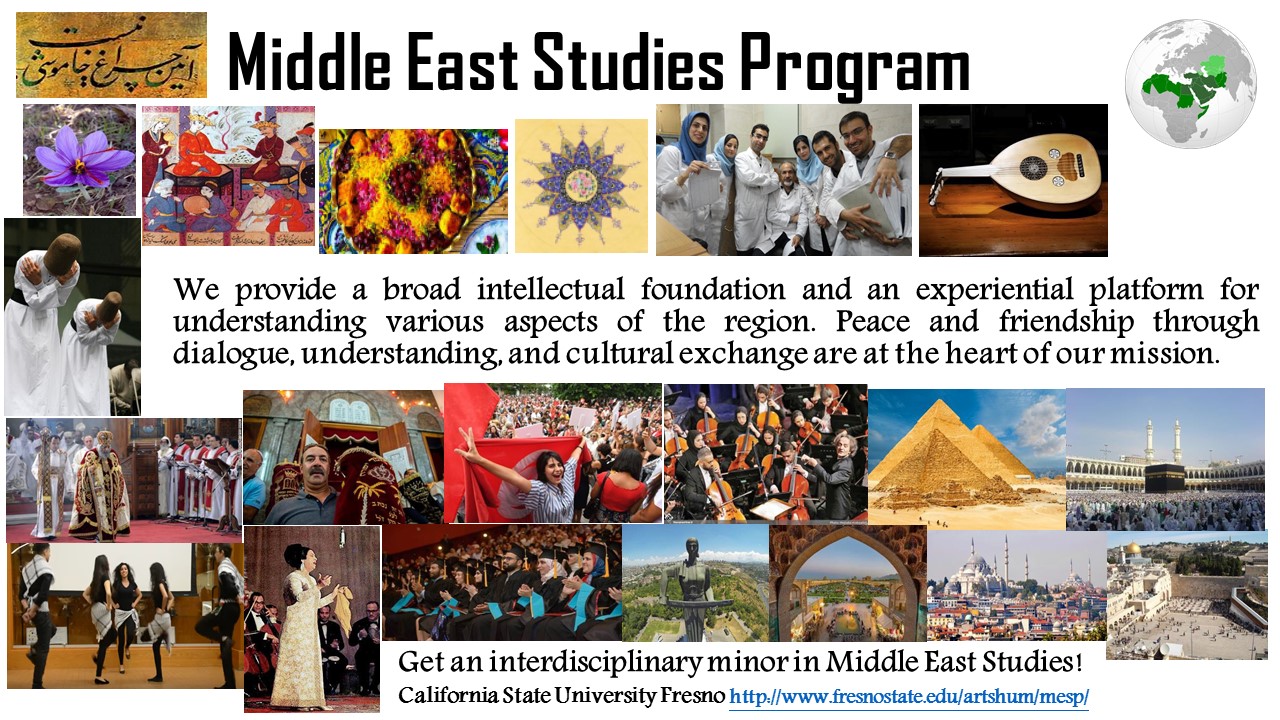Middle East Studies Program

*poster images have been taken from various public websites (download poster here)
Interdisciplinary Minor in Middle East Studies
The Interdisciplinary Minor in Middle East Studies is housed in the College of Arts and Humanities Department of Philosophy, in collaboration with the College of Social Sciences. Faculty members with expertise in areas related to Middle East Studies are spread out among various departments in the Arts and Humanities and the Social Sciences and some in the Craig School of Business.
***To replace an elective course with another MES-related course please request an approval from the MES Program Director, and then fill out the necessary forms with the help of your Department/College Advisor***
Interdisciplinary Minor in Middle East Studies
The Minor in Middle East Studies is a broad, interdisciplinary program designed to provide students from all disciplines with an introductory foundation of knowledge about different subjects related to the Middle East. Students will select from a variety of courses offered throughout the university that study the linguistic, social, cultural, artistic, literary, historical, political and economic factors that define this region of the world. Upon completion of the minor, students will be able to communicate in one of the languages spoken in the region, have a broad contextual understanding of the region, and be afforded the opportunity to gain in-depth knowledge in one or more areas of study related to the region. The minor is composed of 21-23 units. These include 3 units of a required lower-division introductory course MES 10; 6-8 units of lower-division courses in Middle Eastern languages selected from Arabic, Armenian, Hebrew, and Persian; and 12 upper-division units selected from courses offered by the departments participating in this program. Courses taken for the minor may count toward fulfilling General Education requirements, but not toward fulfilling the student's major. Students in the minor must maintain a minimum GPA of 2.5.
Required Course (3 units)
MES 10 (fulfills G.E. Area D3)
Lower-division Language Requirement (6-8 units)
Select from: ARAB 1A-1B; ARM 1A-1B; HEBR 1A-1B; PERS 1A-1B (some courses fulfill GE
Area C2)
Electives (select 4 courses) (12 units)
ANTH 135; ECON 183; ENGL 179, 193T; HIST 107, 109T, 110; MUSIC 171; PHIL 139, 158;
PLSI 144T; SSCI 150T
Total (21-23 units)
*Other courses may be used to fulfill electives upon approval by minor advisor. Some options include but are not limited to:
—French 149—Voices of Africa— Study of representative works by African writers which reveal the attitudes of modern Africans toward their land, their traditions, and their encounter with the 21th century world. Course taught in English. G.E. Integration IC.
—Economics183—Political Economy of the Middle East—
Course Description
Anthropology 135—Muslim Communities in the Middle East—Survey of both rural and urban Muslim cultures and societies in the Middle East with an emphasis on a variety of lived experiences of Islam, gender and ethnic relations and their impact on the West.
Economics 183—Political Economy of the Middle East— A survey of historical, social, cultural, political, and economic development in the Middle East.
English 250T—Asian Literature and Western Orientalism—Emphasizes reading, appreciation, examination and exploration of Eurocentric and American
interpretations of some great works of Asian literature, while developing an understanding
of their historical and cultural contexts. Asian literature includes Southwest Asian
(Middle Eastern, Arabic & Persian), South Asian (Indian, Sanskrit & English), and
East Asian (Chinese).
History 107—Modern Middle East—Analysis of Middle Eastern history with emphasis on the 19th and 20th centuries.
Music 171—Introduction to the World's Music—Exploration of selected musics of the world from the perspective of ethnomusicology
or study of music as an aesthetic communication that possesses meaning only in relation
to specific, situated socio-cultural contexts. Study of selected musical forms and
their relationship to social formations. GE Integration IC.
Philosophy 165T—Islam—Multidisciplinary and comparative introduction to Islam. An examination of how four
particular issues have been interpreted over time from anthropological, sociological,
and comparative religious perspectives.
Social Sciences 150T—Islamic Civilization—An overview of history, politics, culture, and the arts relevant to Islamic heritage.
Social Sciences 159 T—Women in Islam—Explores the social and cultural roles of women and girls in Muslim cultural contexts,
the sources of Islamic authority on gender issues, and contemporary cultural controversies
concerning work, modesty practices, marriage and family life, social leadership, legal
status, religious traditions, Muslim women’s rights movements and political activism.